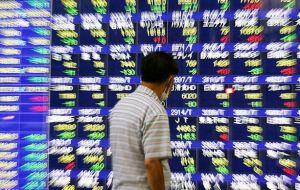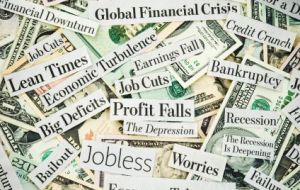MercoPress. South Atlantic News Agency
World economy heading for the perfect storm?
 The financial crisis everybody has been waiting for is a “hard landing” of the Chinese economy, the world's second-biggest. It now seems to have arrived..
The financial crisis everybody has been waiting for is a “hard landing” of the Chinese economy, the world's second-biggest. It now seems to have arrived..  The second crisis is a credit crunch sabotaging economic growth in almost all developing countries except India
The second crisis is a credit crunch sabotaging economic growth in almost all developing countries except India  Another crisis is looming for Europe, North America and Japan, with recession on the horizon before they have fully recovered from 2007/08 bank crash.
Another crisis is looming for Europe, North America and Japan, with recession on the horizon before they have fully recovered from 2007/08 bank crash.  The problems that caused the crash of 2007-08 have not really been addressed, just papered over, with absurdly low interest rates and “quantitative easing”
The problems that caused the crash of 2007-08 have not really been addressed, just papered over, with absurdly low interest rates and “quantitative easing” By Gwynne Dyer - Good things come in threes, but so do bad things. Especially in economies. The financial crisis everybody has been waiting for is a “hard landing” of the Chinese economy, the world's second-biggest. It now seems to have arrived, though the Chinese government is still denying it.
The second crisis is a credit crunch sabotaging economic growth in almost all developing countries except India. Since commodity prices have collapsed, their dollar earnings from exports have collapsed, and in many cases their currencies have fallen to historic lows against the dollar.
A third crisis is looming in the developed economies of Europe, North America and Japan, which can see another recession on the horizon before they have even fully recovered from the effects of the banking crash of 2007-08.
These crises are all connected. When the huge mistakes and misdeeds of American and European banks caused the Great Recession of 2008, China escaped the low growth and high unemployment that hurt Western countries by flooding its economy with cheap credit. Between 2007 and 2014 total debt in China increased fourfold.
Crazy, maybe, but the Chinese government is more terrified of mass unemployment than anything else. It believes, probably correctly, the Communist regime's survival depends on delivering continuously rising living standards. So the Chinese economy went on booming for another six years, but the “solution” was fraudulent and now it's over.
Since the crash on the Chinese stock markets began last month, the government has done everything it could to stop it. It has dropped interest rates repeatedly, it has devalued the currency, it has ordered state institutions to invest more -- and nothing has worked.
Chinese exports have fallen eight per cent in the past year, and even the regime admits the economy is growing at the lowest rate in three decades.
Now for the second crisis. While China's artificial boom kept on rolling, its appetite for commodities of every sort, from iron to soya beans, was insatiable, so commodity prices went up. The other “emerging economies” grew fast by filling that demand, they attracted large amounts of Western investment because of their rapid growth, and they borrowed freely because Western interest rates were at rock-bottom.
The collapse of Chinese demand ends this party too. From Brazil to Turkey to South Africa to Indonesia, exports are falling, the value of their currencies is tumbling, and foreign investors are fleeing. Capital flight from the 19 largest emerging market economies has reached almost one trillion dollars in the past 13 months.
And the third crisis, in the West? The problems that caused the crash of 2007-08 have not really been addressed, just papered over. What limited growth there has been in Western economies is due almost entirely to absurdly low interest rates and “quantitative easing” (governments printing money).
The average time between recessions in the West is seven to 10 years, so one is due around now anyway. The likeliest trigger for that is a collapse of demand in China and in the other emerging economies, which is now practically certain. And when it hits the West, neither of the traditional tools for pulling out of a recession will be available. Interest rates are already near zero, and the economies have already been flooded with cash.
It would be rash to talk about a long-lasting global depression in the style of the 1930s, because a great many things have changed since then. But it is certainly safe to say that the global economy is heading into a perfect storm.




Top Comments
Disclaimer & comment rules-

-

Read all comments“China...has dropped interest rates repeatedly, it has devalued the currency, it has ordered state institutions to invest more -- and nothing has worked.”
Sep 02nd, 2015 - 12:44 pm 0That's because nobody believes the Commie Mandarins anymore.
Allowing the state pension fund to dabble in the market is going to come back to bite them and may well foment the trouble they are so anxious to avoid.
Off Topic.
Sep 03rd, 2015 - 01:59 am 0But I must post because MP fails to cover this.
http://panampost.com/editor/2015/08/26/chavezs-daughter-is-filthy-rich-and-that-shouldnt-be-a-surprise/
We should be told!
Commenting for this story is now closed.
If you have a Facebook account, become a fan and comment on our Facebook Page!